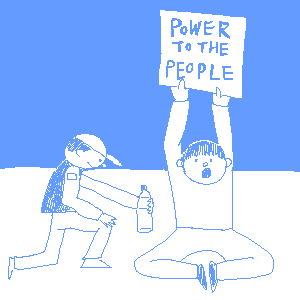Police usually interact with violence, sexist and racial prejudice.
Don't trust them :o)
There is various cops versions.
The Good Cop
- "How about you talk, and we'll get you some better food and rights?"
The Bad cop
- "My partner plays by the book. I don't. If you want your month to stay intact, make it talk!"
The Nietzchean cop
- "There is no universal morality. Only will to power. And with that knowledge in mind, I have chosen to be an interrogator."
The MislavZugaj cop
- "Depending on what how things are developing by Friday, I might organise invididual talks. But as always, your word above mine, there just has to be a word."
The MislavZugaj cop Part Two
- "Don't upload *existing* images, content, memes, drawings, screenshots, art etc. on the wiki. All content must be of your own making. This allows for the upload of edits, and using/collaging found material, so there's plenty of flexibility.
- But in general, it feels a lot easier to engage with content you yourself have provided: it asks a lot more of the viewer, and makes it more inviting to react to and collaborate. Just look at our (current) amazing parrot logo!
- This is a hard, dictatorial assignment restriction."
The Dutch cop
- "Sorry we don't have time and human resources to look into your case right now. You can object or hire a lawyer." [ACAB]
The Foucault Cop:
- "Society is a cop, the individual is a prisoner"
The Žižekian Cop:
- "The odd thing was that before the Police closed in on me, I was in fact offered what in that instant appears as a moment of wholly free choice. Without words and almost without images, a fact about myself was somehow presented to me. I became aware that I was holding something ajar, or shutting something out. Or, if you like, that I was wearing some stiff clothing, like corsets, image a full rioting gear, or even one of those things Elisabeth I used to wear, as if I were a steamed lobster. I felt myself being, there and then, given a free choice. I could open the door or keep it shut; I could unbuckle the heavy suit or keep it on. Neither choice was presented as a duty; no threat or promise was attached to either, though I knew that to open the door or to take off the corset meant the indeterminable. I am at a crossroads with no exit. The choice appeared to be momentous but it was also strangely unemotional. I was moved by no desires or fears. In a sense I was not moved by anything. I chose to open, to unbuckle, to loosen the rein. I say, “Yes officer, I did it,” yet it did not really seem possible to do the opposite. On the other hand, I was aware of no motives. You could argue that I was not a free agent but then does such a person really exists?, but I am more inclined to think this came nearer to being a perfectly free act than most that I have ever done. Close to. Necessity may not be the opposite of freedom, and perhaps a woman is most free when, instead of producing motives, she could only say, 'I am what I do.' Then came the repercussion on the imaginative level. I felt as if I were a woman of snow at long last beginning to melt. The melting was starting in my back—drip-drip and presently trickle-trickle-trickle-lickle. I rather disliked the feeling. "
How can police interaction support Power To the People (Poder Para As Pessoas)?

CategoryConnectingQuestions